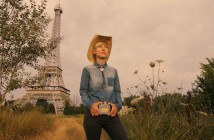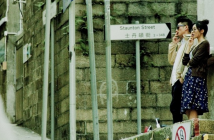A deadpan movie, which begins with a series of unpretentious shots of talking faces, slowly turns into a low-budget spectacular, as the images on the screen are impregnated with film history. Near the end, swamped in fugitive references, A Useful Life growls with swells and eddies of feeling, every small moment elevated into an epiphanic orgasm, so that everyday existence becomes the battleground for ecstatic freedom.
Although it portrays the downfall of a cinemateque and the resulting unemployment of one of its employees, this is not a dreary elegy about the death of cinema. If anything dies, it’s not the medium itself but its iconic venue. Jorge, film lover extraordinaire, curator, radio host, and active member of the cinemateque, swims in celluloid all day; film is the source of his only social interactions, the topic of most of his conversations, and the subject of many of his thoughts.
When the theater, which he runs with a few others, is closed for being economically unsustainable, Jorge is forced to confront the outside world, and after shedding a few tears, he finds in the space of the city a stage to practice all the whim and poetry that cinema has shored up inside him. He dances on university steps as if he were in a musical, or as if he meant to imitate Corine Marchand in Cleo from 5 to 7. He gets a haircut and walks around Montevideo with the same shell-shocked wonder as the country couple who visit the fantasy metropolis in Murnau’s Sunrise. The soundtrack cracks with the music of Eduardo Fabini, a Uruguayan composer from the early 20th century, whose pieces quiver with the reverberations of classic movie scores, and we almost expect Cary Grant or Audrey Hepburn to make guest appearances. Rather than recognizing the specific citations, viewers are meant to pick up a general mood, the smell and texture of the oldies, suddenly flooding the life of Jorge.
The cinephilic experience here is intimate and personal, which perhaps it always was to begin with, but now it is no longer complemented by the social habit of sitting in a darkened room with other people. When the theater shuts down, Jorge brings cinema along with him, like the bibliophiles in Fahrenheit 451, who save literature by memorizing whole novels, carrying texts in their minds like human Kindles. Jorge performs cinema across the city, severing his ties with the theater, the cave of shadows where he spent more than twenty years, to move his body to the rhythms of his creative fancy, fixing his gaze upon some fish on a pond because beauty is everywhere. Cinema has taught him to look.
[notification type=”star”]90/100 - A Useful Life growls with swells and eddies of feeling, every small moment elevated into an epiphanic orgasm, so that everyday existence becomes the battleground for ecstatic freedom.[/notification]




